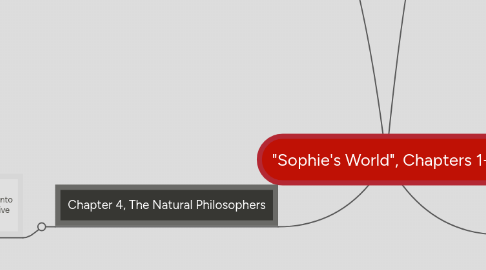
1. Chapter 3, The Myths
1.1. Sophie receives "The Mythological World Picture"
1.1.1. Must understand mythological picture of the world to understand early philosophers' thoughts.
1.1.1.1. Thor was thought to be the god of fertlity because he was able to cue rain by swinging his hammer. His hammer also gave him unlimited power. There is a myth that Thor dressed as a women to defeat the evil Thrym and regain his hammer, so there would not be a drought.
1.1.1.1.1. Thismyth attempted to explain, perhaps, the changing seasons of the year. Myths try to give an explanation. Also, religious ceremonies were carried out relating to myths.
1.1.1.2. Homer recorded Greek mythology as well, but was criticized because the gods were thought to resemble mortals too much.
1.1.1.3. In the Greek city-states people could question the way society must be organized, and could also ask philiosophical questions.
1.1.1.3.1. "The aim of the early Greek philosophers was to find natural, rather than supernatural, explanations for natural processes" (27).
2. Chapter 4, The Natural Philosophers
2.1. Receives "Is there a basic substance that everything else is made of/ Can water turn into wine? How can earth and water produce a live frog?" (29).
2.1.1. Greek philosophers, natural philosophers, assumed something had always existed. Nature was in a constant state of transformation, but how culd something transform?
2.1.1.1. Early philosophers believed there must be a basic substance at the root of all change.
2.1.1.1.1. Modern philosophers are more interested in how the earllier philosophers thought than what they thought.
2.1.1.1.2. Theywere interested in the underlying laws of nature, and wanted to understad without turning to ancient myths. Wanted to study te actual processes. "So philosophy gradually liberated itself from religion" (31).
3. Chapter 2, The Top Hat
3.1. Receives the Course in Philosophy, first envelope
3.1.1. "How was the world created? Is there any will or meaning behind what happens? Is there a life after death? How can we answer these questions? And most important, how ought we to live?" (13). There are not many philiosophical questions, but many different answers. So which is correct?
3.1.1.1. Philosophers search for correct answer.
3.1.2. Philiosophy is similar to a magic trick.
3.1.2.1. We would like to know how we are being tricked. We are the rabbit being pulled out of the hat, and we would like to know how we got here.
3.1.2.1.1. We live deep in the rabbit's fur. Philosophers try to climb up and see the world, but others stay nestled deep down with no wonder or curiosity.
3.2. Receives second envelope
3.2.1. "The only thing we require to be good philiosophers is the faculty of wonder" (15).
3.2.1.1. Lose this wonder as we grow older, as we are not surprised by the sights we see, becomes a habit.
3.2.1.1.1. But we begin to take the world for granted, we lose the ability to wonder about the world. Philosophers, however, continue to question and do not climb down into the rabbit's fur.
4. Chapter 1, The Garden of Eden
4.1. Sophie asks questions, but does not invest herself in them.
4.1.1. "It was extraordinary how everything burst forth at this time of the year! What made this great mass of green vegetation come welling up from the dead earth as soon as it got warm and the last traces of snow disappeared?" (Gaarder 1).
4.2. Then, Sophie receives the letter asking, "Who are you?"
4.2.1. Puzzeled, Sophie Amundsen? But what if she had been given a different name? Would she be a different person?
4.2.2. Is the answer to this question associated with her looks? She doesn't know who she is, and she realizes she had no say in her looks. She thinks she did not even chose to be a human being.
4.2.2.1. "What was a human being?" (4).
4.2.3. Sophie then realizes, once in the garden, she will die one day. She begins to think about life and death. "You can't experience being alive without realizing that you have to die, she thought. But it's just as imposssible to realize you have to die without thinking how incredibly amazing it is to be alive" (5).
4.2.3.1. "Was there life after death?" (4)
4.3. Receives second letter, "Where does the world come from?
4.3.1. Sophie does not know, only a small planet in space.
4.3.1.1. "But where did space come from?" (7)
4.3.1.1.1. Has it always existed? Can anything have always existed? Everything must have a beginnning. But at some point something must have come from nothing.
4.4. "Who had jolted Sophie out of her everyday existence and suddenly brought her face to face with the great riddles of the universe?" (7).
4.4.1. Her garden in which she contemplates these complex questions is similar to the Garden of Eden. She is awakened, not as innocent, gains knowledge, questions the world.
